Electribe 101’s Billie Ray Martin talks to SDE
…about the Electribal Memories reissue
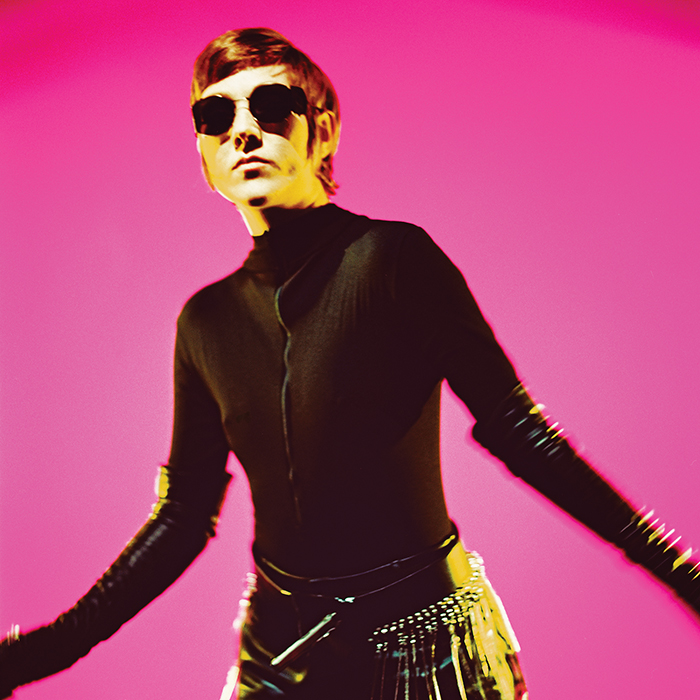
This month sees the reissue of Electribe 101’s 1990 debut album, Electribal Memories – it’s available as a deluxe 4CD set, with remixes, rarities and demos, and also as a half-speed remastered vinyl edition.
The group, who were managed by pop svengali, Tom Watkins, (Pet Shop Boys, Bros and East 17) were formed when Hamburg-born/London-based singer-songwriter, Billie Ray Martin, who had been part of acid house group S’Express, teamed up with four musicians/producers from Birmingham (Joe Stevens, Les Fleming, Rob Cimarosti and Brian Nordhoff), who answered her advert in the Melody Maker: ‘Soul rebel seeks musicians – genius only.’
Electribe 101’s sound was influenced by the deep house music coming out of Chicago and Detroit, as well as soul, but also had a dark, cinematic and European edge – so much so that the band were invited to support Depeche Mode on their 1990 World Violation tour but met with a hostile reaction from the headline act’s devoted fans.
Electribal Memories featured the hit singles ‘Talking With Myself’ and ‘Tell Me When The Fever Ended’, and the band were tipped for great things, but when the album was released, it stalled at number 26 in the charts.
Dropped by their label, Phonogram, the group split in 1992 – their aborted second album, Electribal Soul, finally saw the light of day in 2022 – and Martin launched a solo career. Her 1994 single, the hi-NRG dance-pop anthem ‘Your Loving Arms,’ was a major hit in the UK and Europe. In a very revealing interview, she tells SDE why it’s been so difficult to get Electribal Memories reissued, reflects on the making of the album and the highs and lows of the band’s short-lived career, and updates us on the progress of the four (!) solo albums she’s currently working on.
SDE: Was the reissue of Electribe 1O1’s debut album prompted by the success of the release of the ‘lost’ follow up, Electribal Soul, or has it been on the cards for a while?
Billie Ray Martin: It’s been a plan for, I’m going to say, 15 years – what prevented it was Universal Music being obstructive if I’m being honest. I kept getting in touch with them and they either didn’t respond or wanted money in advance – because it was just me doing it, I wasn’t successful.
So, it’s now being reissued on Demon Music…
Demon were more patient with Universal than I could ever be as an individual person – it took them about a year to get everything sorted, I think. Demon are so professional because that’s what they do – they’ve heard it all and seen it all before.
It’s coming out as a 4CD set and a half-speed remastered vinyl version. Is it nice to have it back out there as a physical release?
It’s really exciting and I only found out a while ago that Demon are doing a nice package – as far as I understand the 4CD version is like a seven-inch design. There’s also a signed edition. It looks really good, and I didn’t expect that, because prior to talking to Demon I was in contact with another reissue company – they were going to do a really cheap and horrible version, and I prevented it from happening. They were talking about a photocopied sleeve and a master where someone was running it through a laptop, using software I’d never heard of. I ended up saying: “No – it’s not going to happen.”
It then took me some time to try and find a new company. Also, the success of the second album, and the beautiful press responses we had, also inspired Demon to get on board. With the mastering, I had to trust Demon and the engineer at AIR because I’m so anal about mastering – I reject everything three times. I said to them, “I trust you on this, otherwise it will never come out.”
But have you been closely involved with the rest of the project?
Yes. I am really particular when it comes to all that stuff – nothing goes out without me being happy about it. People have been waiting for a long time, so you can’t give them shit! I was involved from the start because I’m friends with the graphic designer [Philip Marshall] and we’ve been working together for years. I had the negatives of all the original photo shoots by Lewis Mulatero, so I gave them to Philip and we chose the images together. Prior to that, I’d been restoring them – I went to a printer and had them scanned, repaired and enlarged.
There’s a lot of material on the 4CD set – remixes, rarities and demos. Did you realise you had so much stuff in the archives?
I was the one that had them – it’s all been sitting in my drawer since the ‘90s. I got the tracks digitised and somewhat restored and, finally, I gave them to Demon.
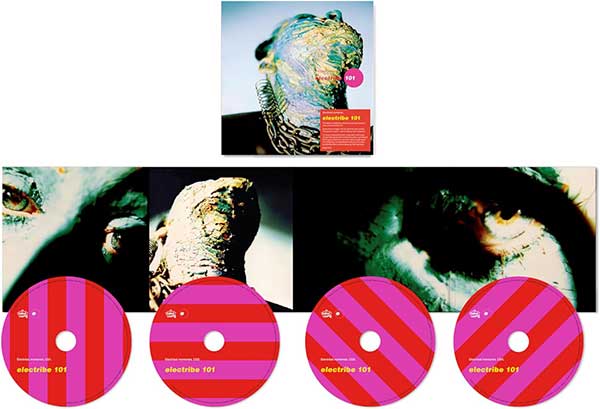
You had a lot of remixes in your back catalogue…
Obviously, a lot of them are known – they came out in one form or another – but it’s nice to have them all, like the ones that were previously only on vinyl. I believe some of them were in Universal’s archives – there were versions that came from DAT or CD, and masters and premasters. I’m glad that I wasn’t the one who had to go through all of that – Demon are good at that.
You had your songs remixed by the likes of Frankie Knuckles, Larry Heard and Mantronix – what did you think of what they did to your tracks?
We pretty much loved all the mixes, and we were big fans of Frankie Knuckles, Fingers Inc. and Larry Heard – that goes without saying. Everything they did was good, and when we heard their mixes, we were ecstatic. The Mantronix remix [of ‘Inside Out’] we rejected but it’s on the box set to present the whole picture – that’s why I wanted it included. It was never released, and people were curious about it. I was the one who wanted Mantronix to remix us, because I was a big fan – I was going in a more pop direction, and they’d produced things that were in the charts. I thought it was beautiful music – very soulful – but when we got the mix, we said no. I think with a better mix it would’ve worked, but they didn’t care enough. It’s alright – it’s good to have it as part of the package.
There are some demos on the 4CD set, including a hypnotic club instrumental called ‘The Spell’, ‘Non-Doctor’ and ‘That’s How Strong My Love Is.’ What can you tell us about those songs?
‘The Spell’ was the first demo the guys played me to write ‘Tell Me When The Fever Ended’ – that ended up being that song. I probably called it ‘The Spell’ because I was writing about a person who wasn’t going to escape a relationship. ‘Non-Doctor’ and ‘That’s How Strong My Love Is’ were either after we’d been dropped by our record company, or just before we got the message. We went into the studio, and I was really into drum and bass and jungle – I said, “Oh – we need to change our style.” I told the guys that every five minutes… In hindsight, it wasn’t a very good idea, but there you go…
I always needed to move forward. I was always in the clubs and coming back saying, “There’s this new thing that we definitely have to do”, and the guys were like, “Hmmm, alright then.” We did all these demos and some of them we weren’t too happy with. The two I thought were worth a listen were ‘Non-Doctor’ and ‘That’s How Strong My Love Is’, but we chose not to release them on the second album because they were attempts but not good enough.
‘That’s How Strong My Love Is’ is a soul-rave banger…
Yeah – I was raving every night! I was in the jungle clubs, which were happening in London, and it was the best time I ever had in my life.
The moody instrumental, ‘Mummy I’m Sick, I’m Underwater’ has a jazz groove. Was that a B-side?
Yes – I think it was, but I’m not the best person to ask – I really like it. I think the guys did it without me one day.
How does it feel now talking about a debut album that came out 34 years ago? What are your thoughts on it?
When you do something and it’s done, you then don’t think about it the next day – it’s just something you’ve done and there are some songs that you’re happier with than others. We promoted it, we went on tour, and people responded to it in one way or another – we focused more on what was happening next.
To be honest, being the way I am – I have an incredible ear for detail – I would probably focus on the things I don’t like. I didn’t have the control and technique in my vocals that I do now or had later – there are songs where I think it didn’t work for my voice, or that I should I have sung it completely different. I was still trying to find my way and I sometimes copied other singers. There are songs like ‘Inside Out’ and ‘Talking With Myself’ where I sound like me because they lent themselves to that, and then there were songs when I was thinking ‘How do I sing that?’ or ‘Let’s just try it like this other singer did…’ They were early attempts, so there are songs where I hate my vocals.
What are your memories of writing and recording the album?
The guys had a studio in Birmingham prior to me joining – it was called Elephant House. That’s where we demoed ‘Talking With Myself’ and recorded ‘Tell Me When The Fever Ended’ – actually, we recorded all the other stuff for the album there – but then I think the record company sent us to another studio to record ‘Talking With Myself.’ I did another vocal, but I said, “No – the demo one is better.” There might have been a third vocal… On the demo you can hear that’s it not quite the same vocal – we used one that was in-between. Sometimes it’s pointless when record companies think you need an outside producer or to go to another studio when it was all good in the first place – it can sometimes ruin bands when they no longer trust their own shit because they’re told to go elsewhere. ‘Talking With Myself’ was weird – we were suddenly thrown in at the deep end, but we went back to the Birmingham studio, and we recorded and mixed everything there.
Do you have a favourite song from the album?
At the time, I remember calling the guys from London… they’d done a final mix of ‘Inside Out’ one evening without me – I would normally be there in Birmingham – and they sent it to me. I said: “This is the most perfect thing you’ve ever done,” and they were really happy. My vocal had some notes that were off-key, but we didn’t care because it was done and there was a vibe. That stands out for me and also ‘Talking With Myself’ – we were a group that had only just met. It’s basically a demo that was then mixed again to make it a bit more perfect – it sounds very similar to the first demo. It stands out for me because it’s what happens when people are being creative.
There’s a homage to Lalo Schifrin’s Mission Impossible theme in ‘Talking With Myself…’
I tried to get rid of that – I said it was naff – but I was outvoted.
Why did you decide to do a cover version of Odyssey’s ‘Inside Out’ on the album?
When I was a kid in Germany, it was a hit – it was always on the radio and my ears pricked up every time it came on. I couldn’t get enough of it, and what struck me about it was that it was different from other soul records. The vocal was quite hypnotic and there weren’t any peaks – it was on the level, and it was an ongoing vibe. Even though the music was funky, there was something hypnotic about it – it came out of the radio at me, and I just thought, ‘Wow’. There are just some songs that stick with you forever…
If someone asked me to do a cover version tomorrow, it would be a song from an early stage in my life.
I suggested ‘Inside Out’ to the guys, and they were immediately into it.
‘Talking With Myself’ and ‘Tell Me When The Fever Ended’ were both Top 40 hits – you appeared on Top of the Pops – and when Electribal Memories came out, it was critically acclaimed, but the album didn’t do that well commercially, did it? In the UK, it only got to number 26. Why do you think it didn’t do better?
The initial sales were 50,000 or something, so the record company didn’t consider us a priority. I think it sold more afterwards. ‘You’re Walking’, which was the third single, was a bit too weird – it wasn’t a big crossover hit. Radio 1 played it, but it wasn’t on the A list, and they didn’t play ‘Inside Out’, which tended to be the kiss of death – it kind of fizzled out.
A lot of club/dance acts at that time made albums with one or two good singles and a lot of filler, but your debut was a really strong record…
I’m a songwriter – that’s what I’ve always done: verse, bridge, chorus… Before I met the guys, I was in a soul band who wrote songs, and I was in a folky-indie band – that’s how I grew up and that’s what I brought to the guys. I didn’t have to convince them to do that – they were already into all that. Their background was reggae and soul and Roxy Music – things like that. None of the guys had a problem with me bringing songs or writing songs – it just came naturally to us. Joe came up with all these beautiful drum loops and hooks – he was the Kraftwerk-y guy in the group and listening back to his stuff was brilliant. I can remember him saying he wanted to do an instrumental because there were too many vocals and the other guys said: “Hold on a minute – no way, let her do her thing.”
Did you like doing TV shows like Top of the Pops?
Up until that point, I was this person who’d been waiting for exposure for what I do all my life, but I didn’t even think about it – you get the call that you’re on Top of the Pops and you go… In those days, my performances looked quite confident – I didn’t give a shit, but now I think ‘Wow’. I looked like someone who really had something to prove, so I was going to show it. Later, when I was on Top of the Pops with ‘Your Loving Arms’, it was different because there was all this pressure – you had to sing live, but you couldn’t move, then you had to stand there and look over there… It was an artificial environment – it didn’t feel natural any more. The BBC and Top of the Pops always changed the rules – sometimes you had to mime when you wanted to sing live, and other times they made you sing live when their set-up wasn’t equipped to deal with it. It was really weird.
You had a striking image – your look was very ‘60s…
In Berlin, I was in a ‘60s revival soul group, so it was just what I brought with me. When we were signed, Tom Watkins put us in contact with the stylist Alan Keys who was brilliant. He said, ‘What do you want to do?’ And I said, ‘Definitely not what Tom Watkins told me’, because he was suggesting that I put a bowler hat on and dye my hair red. I said: “That’s not going to happen…” I wanted to do all the ‘60s stuff and Alan Keys said yes, because nobody else was doing it. I was so happy about it.
You didn’t get on with Tom Watkins, did you?
He was bizarre – we got rid of him. I should write a short book about it because it was not a good experience. As a rule, he would try and sack one of the main band members, and in Electribe 101 that was me! He tried to get rid of me from the start, and the guys were like, “Wait a minute – she’s the singer…” It was really weird and horrible.
The band came together after Joe, Les, Rob and Brian answered your advert in Melody Maker, which read: ‘Soul rebel seeks musicians – genius only.’ Did you get a lot of responses?
Yeah – I met quite a lot of people, and in those days it was pre-internet or email, so people would call. Sometimes I would meet them in rehearsal rooms to sing and play, or we would try and write a song together. The guys came down from Birmingham to meet me quite quickly – we put out a white label of ‘Talking With Myself’ and we were signed pretty much straightaway.
How did you know they were the musicians to work with? Was there chemistry right from the start?
There wasn’t – when they came to meet me, I said no! I didn’t like them, and I thought they were weird – with the Birmingham thing, I couldn’t understand a word they were saying! But Brian called me – he must have had a sense that something was going on with us – and he said: “We have a studio in Birmingham, and you could come and do some demos.” I said: “Oh – a studio in Birmingham…” So, I went up and I took three demos of mine along. One of them was ‘Talking With Myself’, and I also brought a record – ‘Jealousy and Lies’ by Julian Jonah, and I said, “Look, this is the future.” And the guys said: “Yeah – definitely. We’ve been experimenting with this kind of music anyway.” There was an instant understanding and we started out by copying Julian Jonah records completely. We put my demo of ‘Talking With Myself’ and the Julian Jonah record together as a starting point.
Your sound was a mix of Detroit and Chicago house music, as well as soul, and your European sensibilities, and the guys’ eclectic influences. It was a melting point and didn’t really sound like anything else around at that time…
The guys came from diverse backgrounds – they were listening to the same sort of stuff that I was, but Birmingham was a reggae place, so Brian had the dub thing going on – getting into a vibe and sticking with it, and Joe had the whole Kraftwerk and Roxy Music thing. There was all this openness, and when you looked at how the guys mixed records, everything was done live on the desk – this was pre-recall, so if you made a mistake, you had to start again and put down another mix. They would work on a mix for days and I would sit on the sofa, in the background – I would see four guys at the desk, bopping their heads. I would comment on details and moan about what I wanted to change. Anything that disturbed the vocals had to go. The guys had the vocals up loud from the start and they built the mixes up from that – they didn’t start with bass and drums like a lot of electronic people do. They knew the importance of the vocals.
When did you discover you had a great voice – did you sing as a child?
At about two years old – my grandmother always told a story of how people tried to get my attention, but I was just singing – I was sitting on a rocking horse, or in a pram. By the age of five, I made demo tapes of children’s songs and whatever I heard on the radio I would try and copy. When I was six, I told my grandmother I’d made a tape – we had a reel-to-reel-machine – and I wanted her to send it to my favourite singer who I’d seen on the TV. She didn’t, because she didn’t understand any of that. My mother looked after The Beatles – she was a music fan and she worked at the Top Ten Club [in Hamburg]. She ended up in dodgy establishments because she just stayed for the music.
You grew up in Hamburg, in the red light district – when did you move to London?
When I was 23 or 24, but I’d been there before that. There was a period when I ran away from home and went to London to check it out. I always knew I would move to London – when I was five, I had pictures of the Queen and would tell my grandparents I was going there. I also went to Berlin, which was really happening – there was a strong ‘60s revival scene and the Einstürzende Neubauten industrial stuff. I was kind of doing both – I was making weird electronic demos at home with someone, which were batshit crazy, but then I realised I wanted to use my voice in other ways, so I started doing the ‘60s revival thing.
Before Electribe 101, you worked with Mark Moore in S’Express – where did you meet him?
In London – at Shoom [acid house club]. We always say that we met under the strobe lights at Shoom, which is true.
In 1990, Electribe 101 supported Depeche Mode on their World Violation tour. Tell us about that…
We thought it was going to be a great thing because the band invited us – it wasn’t arranged by the record company – but once the tour started, we were bottled off stage every night. The guys were gutted but imagine me as a female in the firing line – I was crying and it was horrible. I actually think it was the start of our band’s breakup. In those days, Depeche Mode fans were evil – I’m sorry, but they came with weapons to use against whoever the support band were. People in Paris arrived with plastic bags full of stuff to throw – one night, I refused to go out on stage.
Why did the band break up? You were dropped by your label, Phonogram, but you’d started work on a new album, hadn’t you?
I don’t think we ever managed to overcome the tension – there was a tension from the start because the guys were a unit already – they’d known each other from their school days maybe. And then I came in… and they always needed to protect themselves from the new person. I was paranoid about that – about not finding my way in. I was also young and moody – I was worried about a lot of things, and I was threatened by Tom Watkins on a daily basis. He said I would never make another record anywhere unless I did what he said, so I was already on edge. I think we could have become a really great harmonious unit – we did like each other, and we had great laughs – but we didn’t get on all the time. Me being in London and them being in Birmingham – they were thinking, ‘Oh, what’s she up to in London?’ They thought I was doing my own thing, and then Tom Watkins was stirring the shit pot, saying I was off on my own. There was all this crap going on, and then Depeche Mode, and me crying because I was being booed off stage every night… There was also stuff going on in their lives which wasn’t easy for them. It wasn’t great – we tried to be as supportive of each other as we could, but we never got a chance. We really did want to try and stay together – we did a second album, but the record company sent us to a studio with an outside producer and that put pressure on the guys – they didn’t like it and were having none of it. Then we were dropped, we were looking for a manager and we didn’t get signed…
Do you have any regrets from that time?
I only have one regret… We were on every magazine cover in the country – we were hailed as the new group that would really make it – and I know the second album would’ve opened all the doors for us and done well, as it’s a good album. It went more in a pop music direction because I was on that trip at that time. Was that a good idea? I don’t know. We never knew the album was good – we thought we were rubbish and we got dropped. That’s the regret I have… we deserved a chance, and it didn’t happen, for a variety of reasons. Our personalities didn’t match and we didn’t get along in the end – we broke up. It’s a shame because all that potential was there.
When SDE last spoke to you, in March 2022, you were working on four solo albums. What’s the latest on that?
I’m still working on them! I’m so meticulous and when I embarked on this journey, I didn’t see myself as a record producer. Each of the albums has a different subject matter and I started these long research phases which can last for anything from six months to a year. I collect sounds and inspirations from other artists and records, and I make mood boards. That goes on forever, and then I source the musicians and the studios because I’m so particular about what I’m going for – it takes time. An engineer recently told me I’m too technical because I pay attention to the gear that the studio has. I’m really anal about all that. I was sourcing musicians which took time, but eventually I ended up with the right people, including members of Tindersticks. When it was in the studio, I was like, “Yes – it was meant to be!” I contacted a lot of people but it didn’t work out – they said no, or they weren’t available, or I checked them out and thought, ‘Hmmm – that doesn’t seem right.’ I’m looking for mix engineers… I need to chill out in the future because it’s taking too long.
Do you think you’ll get something out this year?
Well, I’ve been through a bit of an ordeal… I’ve recorded three of the four albums, but I’m trying to find a mix engineer – I went to a studio to work with a guy, but it wasn’t right for many reasons, so I’ve ended up with some songs that aren’t done, which means I now have to raise some more money. Something may or may not come out this year – the first album was going to be in March. I’ve just come back from a mixing session, and it went a bit pear-shaped – the studio kept exploding! I’m not fucking kidding you! So, on top of me and the engineer not seeing eye to eye, and the electricity blowing up every half an hour, then there was a ghost in the studio – I’m not joking.
That sounds like it could be a concept for your next album…
The ghost in the machine, right? It was fucking bizarre. The fourth album is now firmly planned – that will be plain sailing, because I’m now confident as a producer. I’ve developed my style now. I couldn’t think of being a producer before, but somehow I just ended up doing it, and as I went along, I figured out what I needed to do. Now, I’m like, ‘What’s the problem? I’m doing it.’
I don’t know which album will come out first – the most elaborate one, which has turned out amazing and has some of the Tindersticks guys on it, is about popular French culture we grew up with that has now disappeared – films and music – and it’s about gentrification and Paris being destroyed by neighbourhoods being torn down. I’ve invented characters who walk through Paris, and they reminisce about what it was like when they were young, and what it’s like now – I’m talking about prostitutes and sailors and people that were alive at one point but maybe aren’t now. There’s a lot going on, each song has a theme and the album is influenced by French film soundtracks from the ‘70s, but it’s turned into something different, People are saying, “It’s a bit Tom Waits…” I’m like, “Really? Wow.” I can’t wait to put it out.
One of the albums is about gentrification in Hamburg, and homelessness and prostitution in the red light district I grew up in – the whole city collapsed under the weight of mass tourism and what was destroyed was the soul of Hamburg by city planning. Everything was torn down. That album is mainly live and analogue, but there are some electronic pieces.
Then there’s an album called Poems, which is just piano and vocals – poems about loss that are straight from the soul, and some field recordings. It’s very honest and quite different from what I normally do.
We’d better let you go if you’ve got all these albums to do, but would you like to see any of your older solo record reissued?
No – I’m all about what I’m doing now. The new stuff is the best and the most important thing I’ve ever done.
Thanks to Billie Ray Martin, who was talking to Sean Hannam for SDE.
Electribal Memories is reissued on 15 March 2024, via Demon Music. The signed 4CD edition is limited to 1,000 units and includes a print signed by Billie Ray Martin.
Compare prices and pre-order

Electribe 101
Electribal Memories - 4CD signed edition

|
|
||||||||||||||||||||||||||||||||||||
Compare prices and pre-order

Electribe 101
Electribal Memories - half speed vinyl

|
|
||||||||||||||||||||||||||||||||||||||||||||||||||||||||||||
Compare prices and pre-order

Electribe 101
Electribal Memories - 4CD standard edition

|
|
||||||||||||||||||||||||||||||||||||||||||||||||||||||||||||
Tracklisting
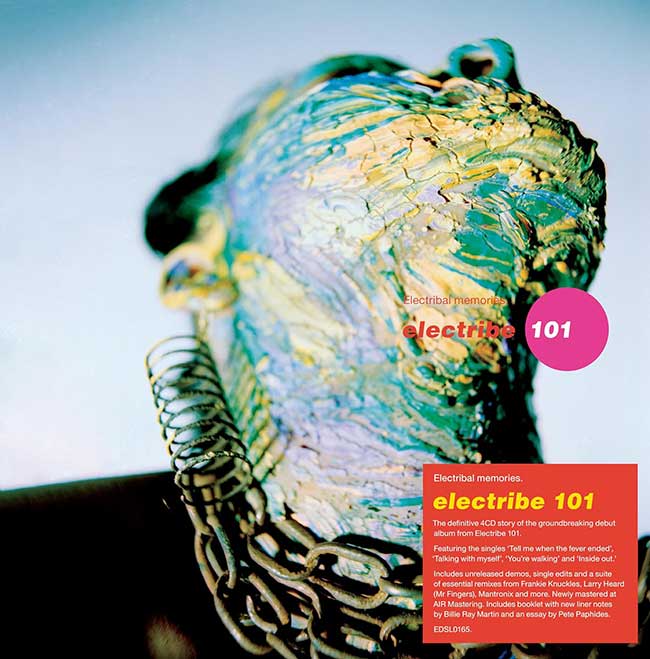
Electribal Memories Electribe 101 /
-
-
CD1
- Talking With Myself (Original Band 12″ Version)
- Lipstick On My Lover
- You’re Walking (Peeping Tom Mix)
- Inside Out
- Diamond Dove
- Heading For The Night
- Tell Me When The Fever Ended (Full Length Version)
- Talking With Myself (Lambada Version)
- Electribal Memories
- Tell Me When The Fever Ended (7″)
- Talking With Myself (Frankie Knuckles 7” Mix)
- You’re Walking (Peeping Tom 7″ Mix)
- Inside Out (Pop Mix)
-
CD2
- Talking With Myself (8-track Demo)
- The Spell (8-track demo)
- Talking With Myself (Deep Dream Mix)
- Lipstick On My Lover (1989 12” Mix)
- Diamond Dove (1989 12” 12″ Mix)
- Tell Me When the Fever Ended (12”)
- Talking With Myself (Frankie Knuckles 12-inch Mix)
- You’re Walking (Corporate Def Mix)
- Inside Out (Anti-Pop Mix)
- Heading For The Night (Night Over Europe)
-
CD3
- Talking with Myself (Opium Mix)
- Tell Me When The Fever Ended (Larry Heard After Dark Mix)
- You’re Walking (Azmafez Mix)
- Heading For The Night (Classic Club Mix)
- Talking With Myself (Jazzy Piano Mix)
- You’re Walking (Ambient Groove Mix)
- Talking With Myself (Brixton Club Mix Master)
- Mummy I’m Sick, I’m Underwater (4:19)
- Talking With Myself (Larry Heard After Dark Dub)
- You’re Walking (Warped Truth Mix)
- Talking With Myself (Next Big Thing Mix)
-
CD4
- Talking With Myself (Frankie Knuckles Edit)
- Diamond Dove (7”)
- Lipstick On My Lover (7”)
- Talking With Myself (Larry Heard After Dark Mix)
- Heading For The Night (Pianoppella)
- Inside Out (MCM Mix)
- Talking With Myself (Frankie’s Lovely Dub)
- Tell Me When the Fever Ended (Yankee Mix)
- Talking With Myself (American Promo Anabolic Steroid Mix)
- Tell Me When the Fever Ended (Raggamix)
- Inside Out (Mantronix Mix 2)
- You’re Walking (Hip Hop Mix)
- Non-Doctor (Demo)
- That’s How Strong My Love Is (Demo)
-
CD1

 Interview
Interview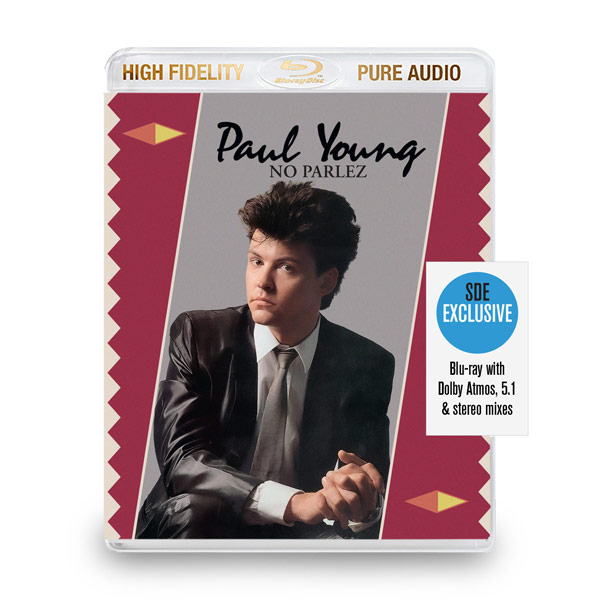
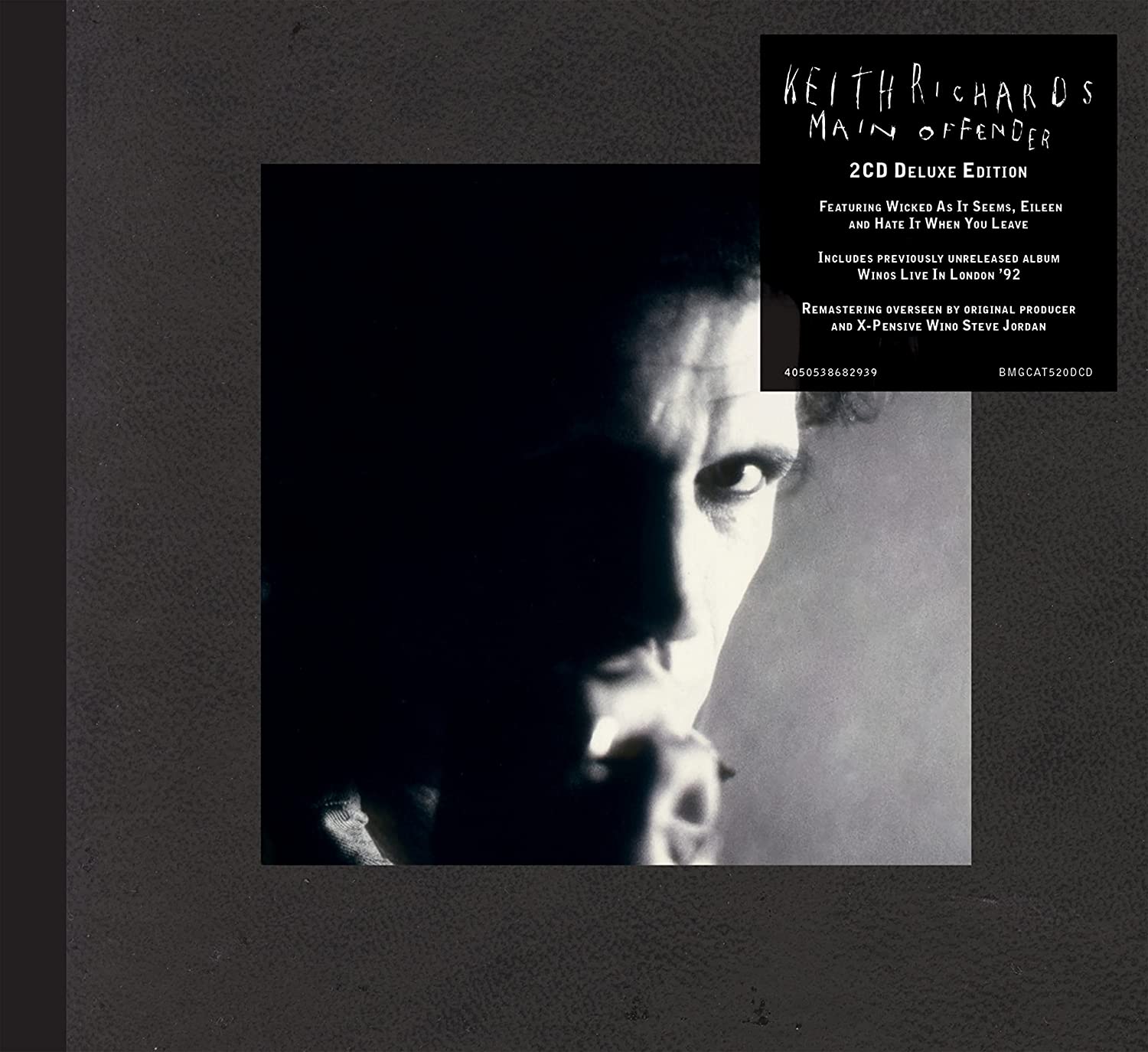
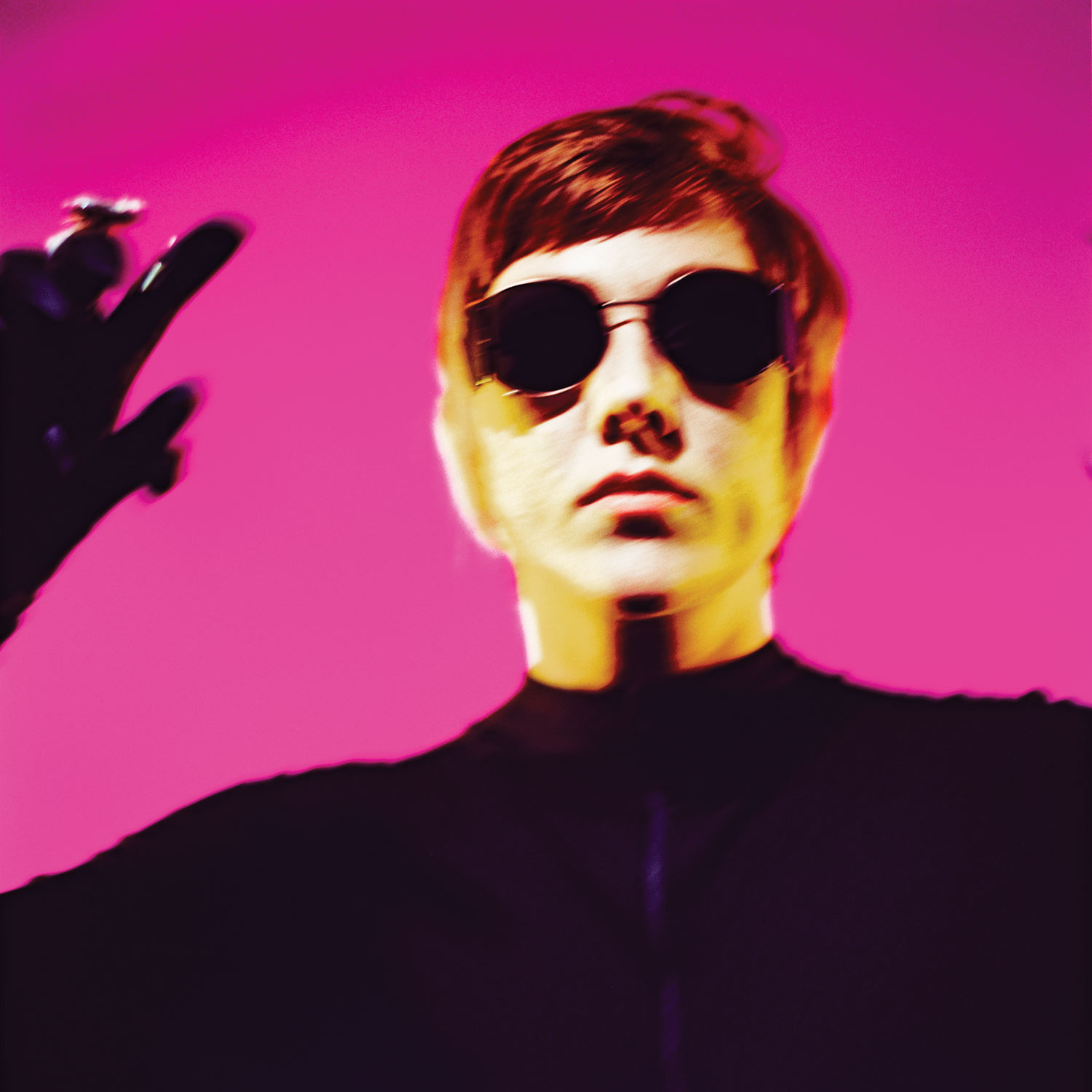
By Sean Hannam
26